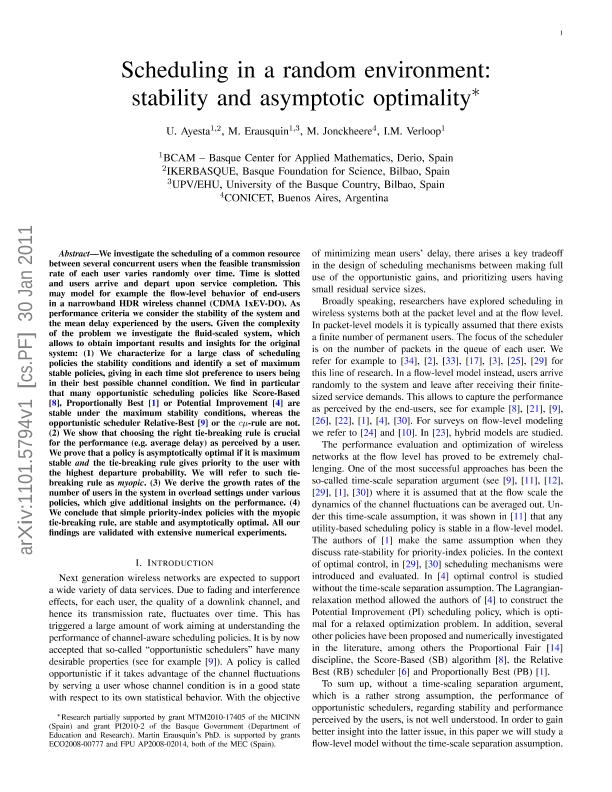Mostrar el registro sencillo del ítem
dc.contributor.author
Ayesta, U.
dc.contributor.author
Erauskin, M.
dc.contributor.author
Jonckheere, Matthieu Thimothy Samson

dc.contributor.author
Verloop, M.
dc.date.available
2017-04-05T18:22:04Z
dc.date.issued
2013-02
dc.identifier.citation
Ayesta, U.; Erauskin, M.; Jonckheere, Matthieu Thimothy Samson; Verloop, M.; Scheduling in a random environment: stability and asymptotic optimality; Institute Of Electrical And Electronics Engineers; Ieee-acm Transactions On Networking; 21; 1; 2-2013; 258-271
dc.identifier.issn
1063-6692
dc.identifier.uri
http://hdl.handle.net/11336/14846
dc.description.abstract
We investigate the scheduling of a common resource between several concurrent users when the feasible transmission rate of each user varies randomly over time. Time is slotted and users arrive and depart upon service completion. This may model for example the flow-level behavior of end-users in a narrowband HDR wireless channel (CDMA 1xEV-DO). As performance criteria we consider the stability of the system and the mean delay experienced by the users. Given the complexity of the problem we investigate the fluid-scaled system, which allows to obtain important results and insights for the original system: (1) We characterize for a large class of scheduling policies the stability conditions and identify a set of maximum stable policies, giving in each time slot preference to users being in their best possible channel condition. We find in particular that many opportunistic scheduling policies like Score-Based [8], Proportionally Best [1] or Potential Improvement [4] are stable under the maximum stability conditions, whereas the opportunistic scheduler Relative-Best [9] or the c-rule are not. (2) We show that choosing the right tie-breaking rule is crucial for the performance (e.g. average delay) as perceived by a user. We prove that a policy is asymptotically optimal if it is maximum stable and the tie-breaking rule gives priority to the user with the highest departure probability. We will refer to such tiebreaking rule as myopic. (3) We derive the growth rates of the number of users in the system in overload settings under various policies, which give additional insights on the performance. (4) We conclude that simple priority-index policies with the myopic tie-breaking rule, are stable and asymptotically optimal. All our findings are validated with extensive numerical experiments.
dc.format
application/pdf
dc.language.iso
eng
dc.publisher
Institute Of Electrical And Electronics Engineers

dc.rights
info:eu-repo/semantics/openAccess
dc.rights.uri
https://creativecommons.org/licenses/by-nc-sa/2.5/ar/
dc.subject
Fluid Limits
dc.subject
Performance Evaluation
dc.subject
Stability Analysis
dc.subject
Cellular Ireless Systems
dc.subject.classification
Estadística y Probabilidad

dc.subject.classification
Matemáticas

dc.subject.classification
CIENCIAS NATURALES Y EXACTAS

dc.title
Scheduling in a random environment: stability and asymptotic optimality
dc.type
info:eu-repo/semantics/article
dc.type
info:ar-repo/semantics/artículo
dc.type
info:eu-repo/semantics/publishedVersion
dc.date.updated
2017-04-05T15:11:46Z
dc.journal.volume
21
dc.journal.number
1
dc.journal.pagination
258-271
dc.journal.pais
Estados Unidos

dc.journal.ciudad
New York
dc.description.fil
Fil: Ayesta, U.. Basque Center for Applied Mathematics; España
dc.description.fil
Fil: Erauskin, M.. Basque Center for Applied Mathematics; España. Basque Foundation for Science; España. Universidad del Pais Vasco; España
dc.description.fil
Fil: Jonckheere, Matthieu Thimothy Samson. Consejo Nacional de Investigaciones Científicas y Técnicas. Oficina de Coordinación Administrativa Ciudad Universitaria. Instituto de Investigaciones Matemáticas "luis A. Santaló"; Argentina
dc.description.fil
Fil: Verloop, M.. Basque Center for Applied Mathematics; España
dc.journal.title
Ieee-acm Transactions On Networking

dc.relation.alternativeid
info:eu-repo/semantics/altIdentifier/doi/http://dx.doi.org/10.1109/TNET.2012.2199764
dc.relation.alternativeid
info:eu-repo/semantics/altIdentifier/url/http://ieeexplore.ieee.org/document/6209453/
Archivos asociados
